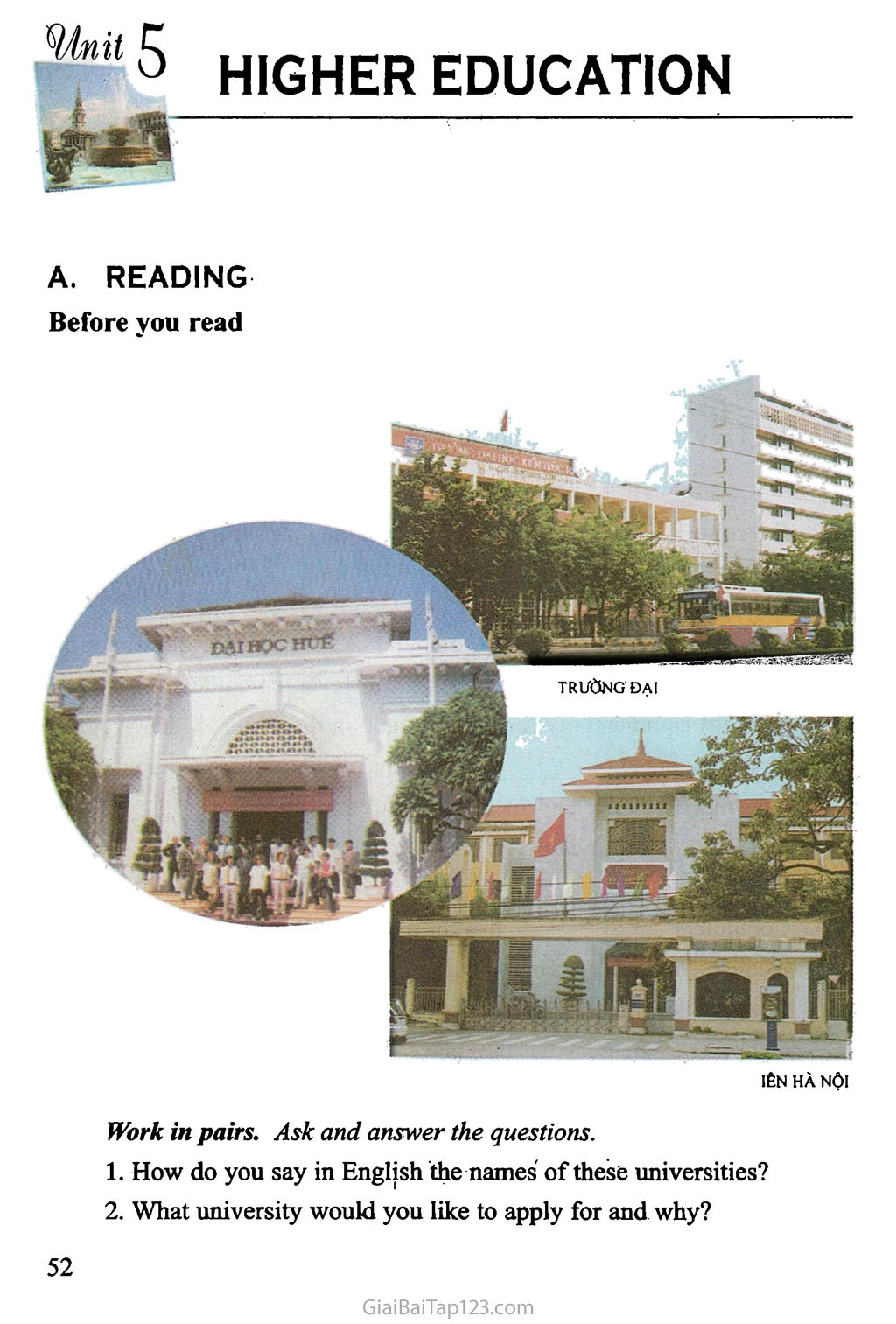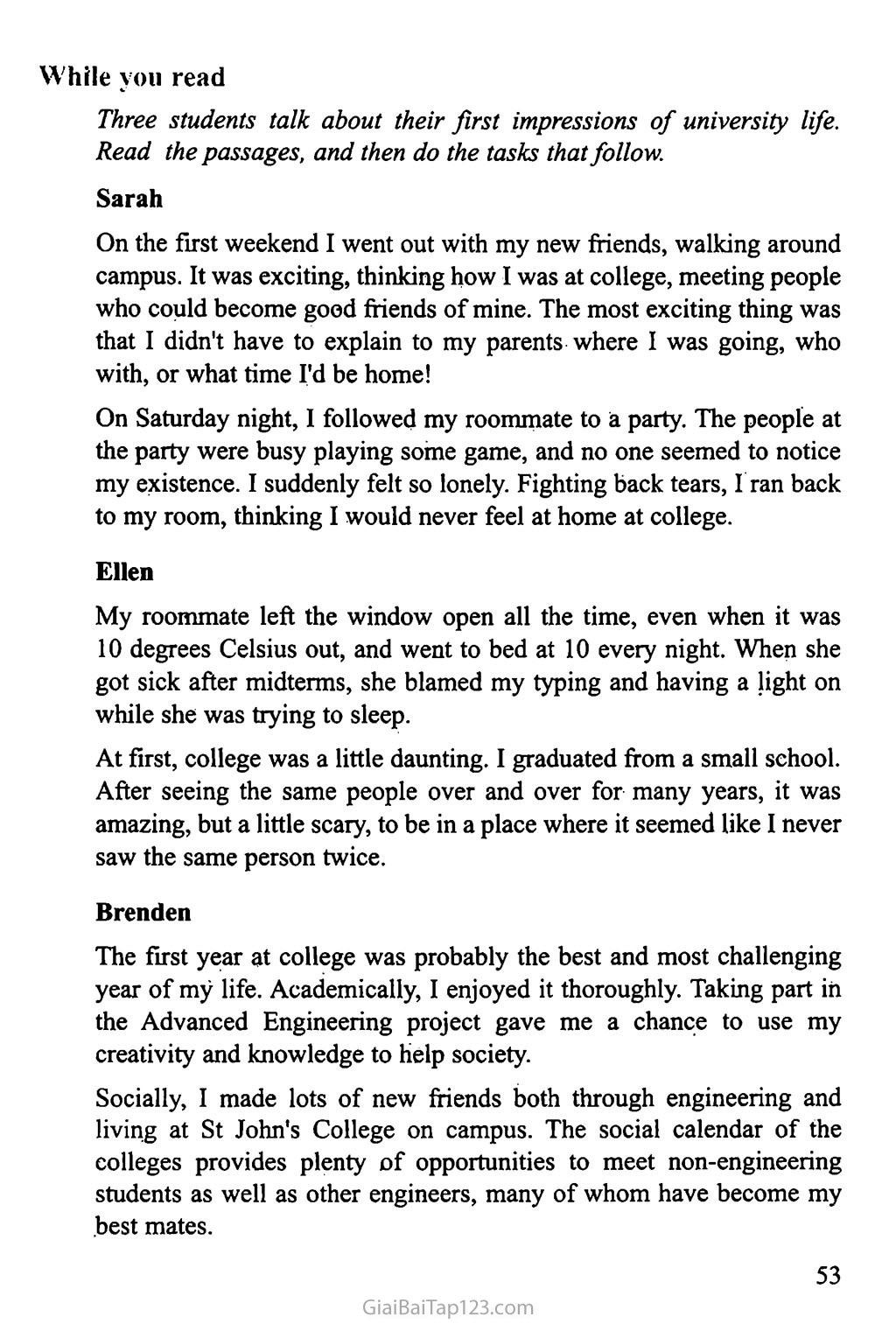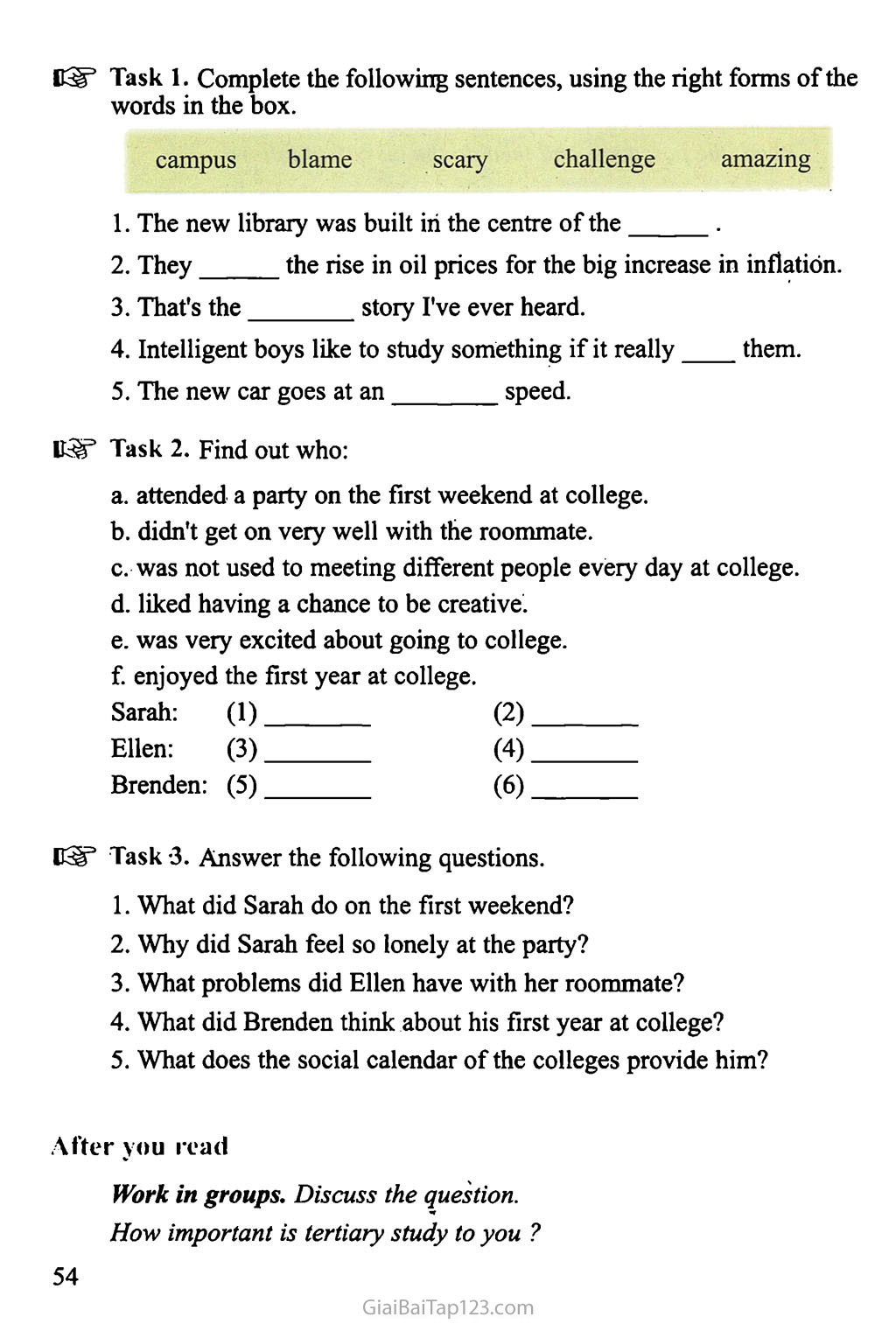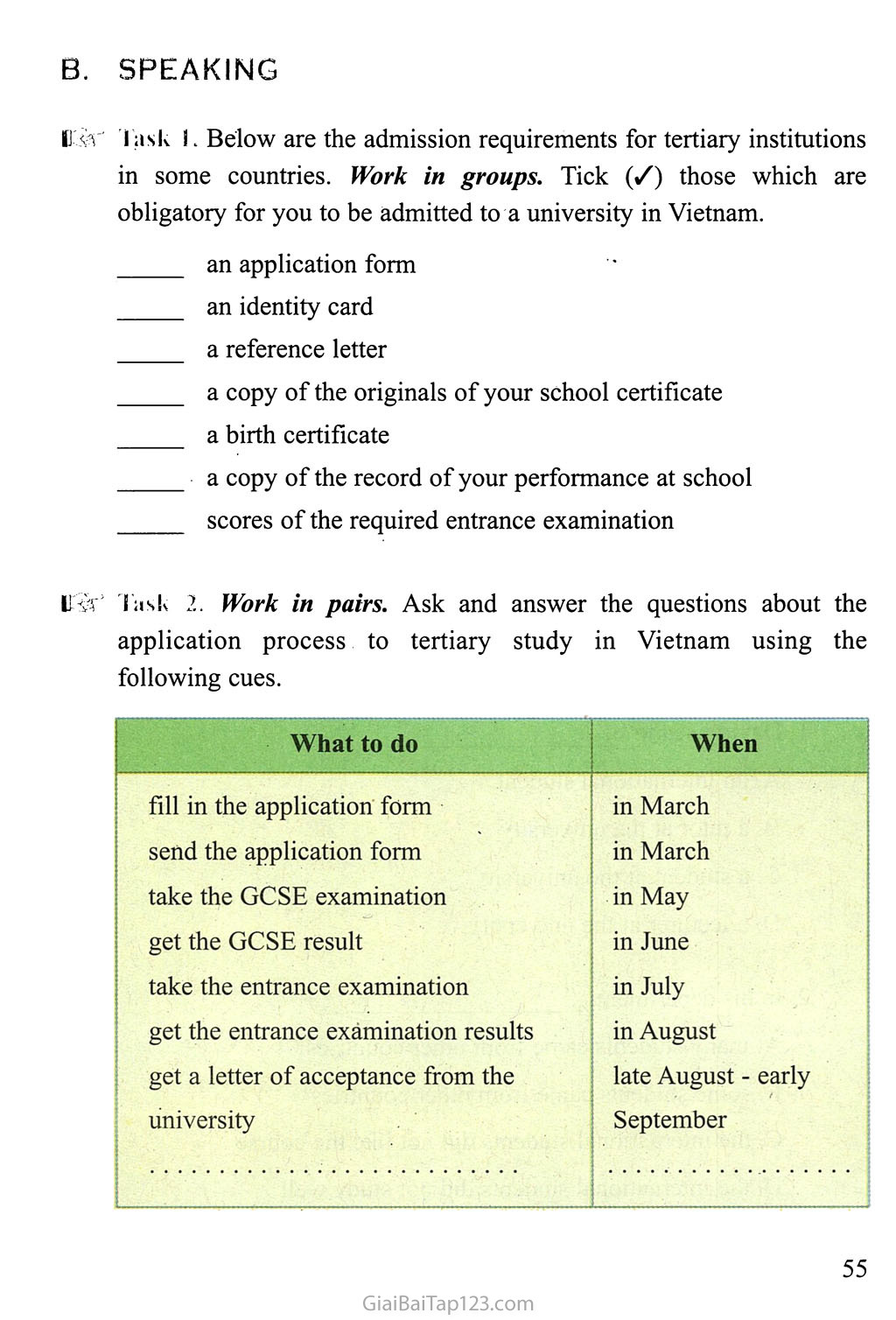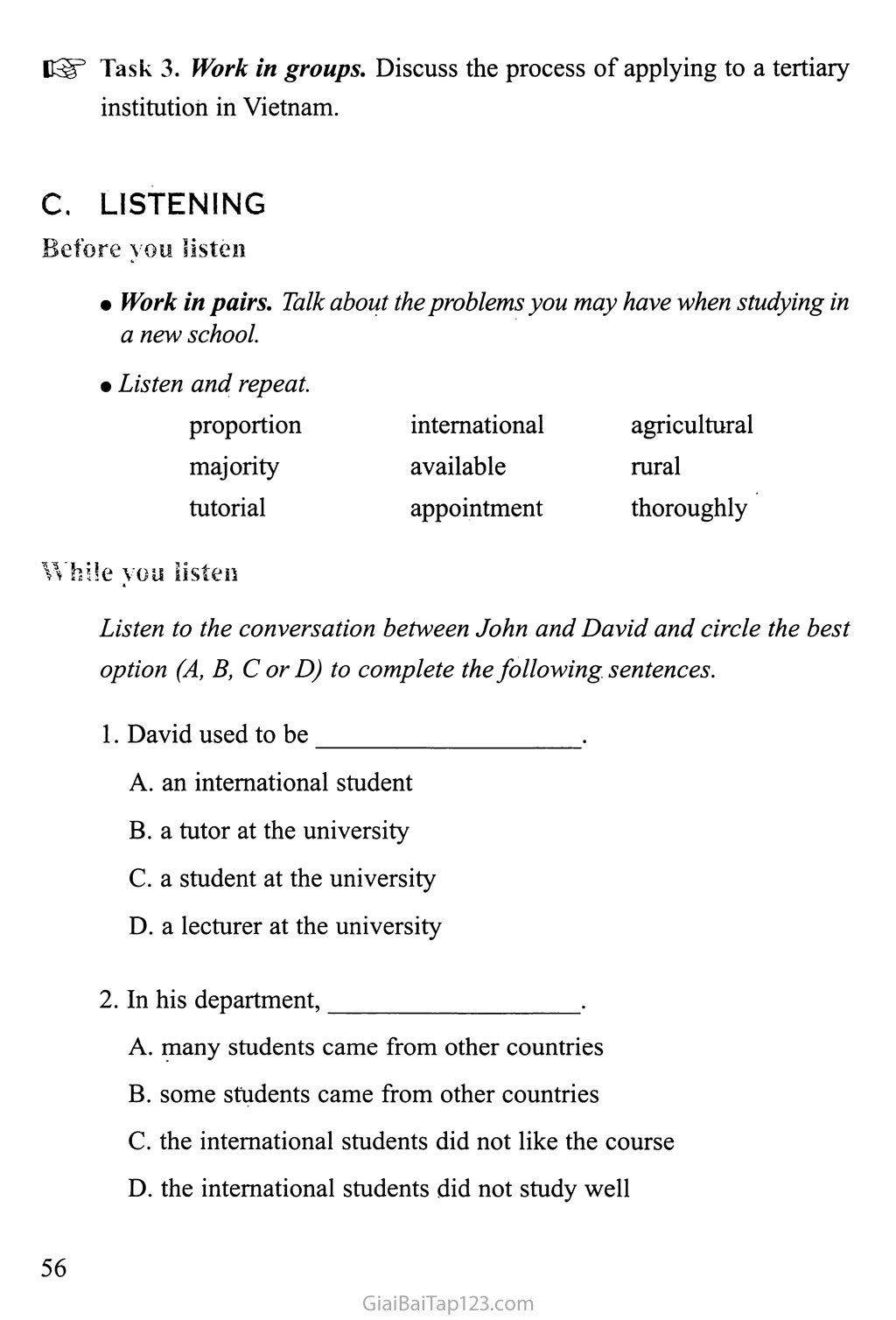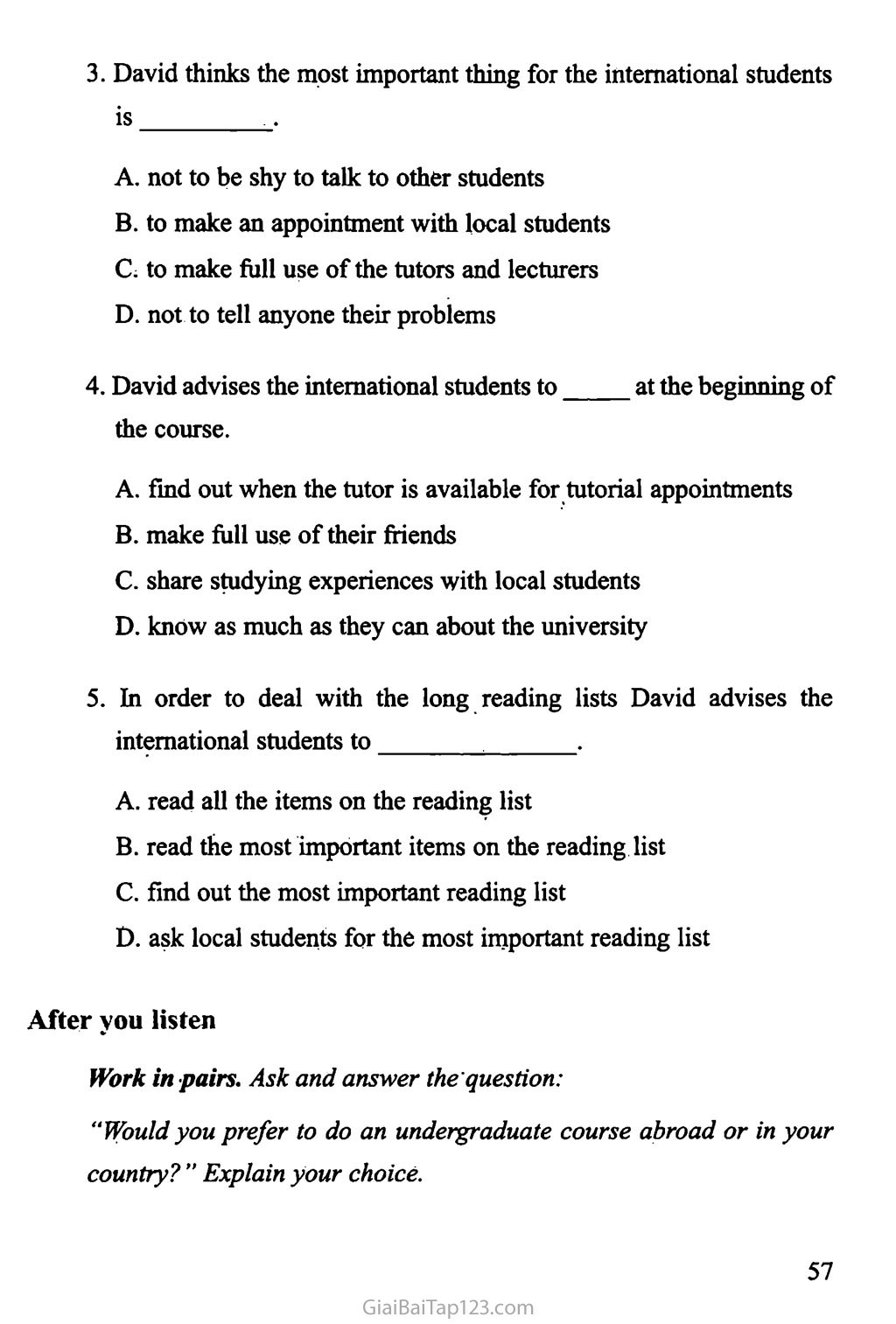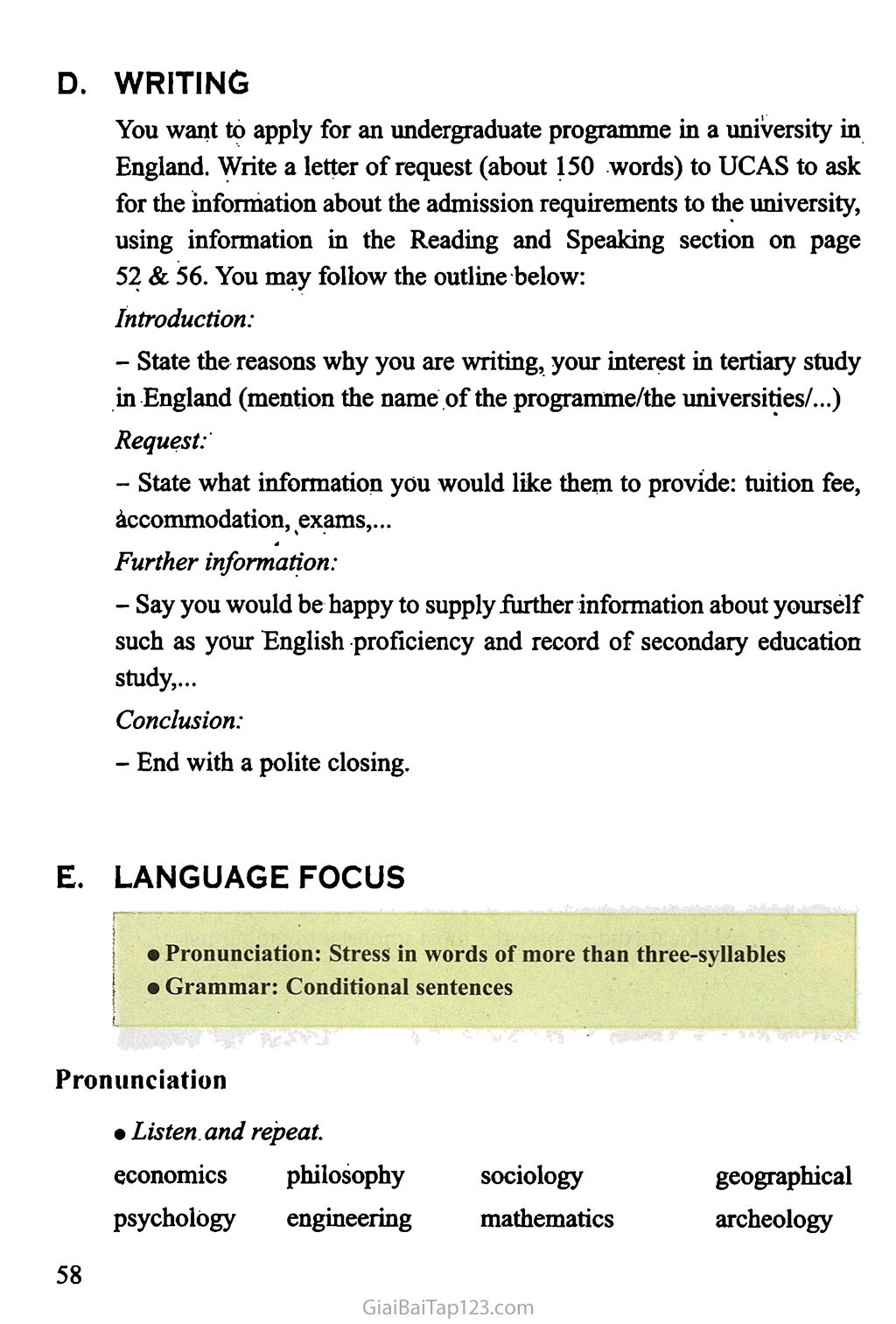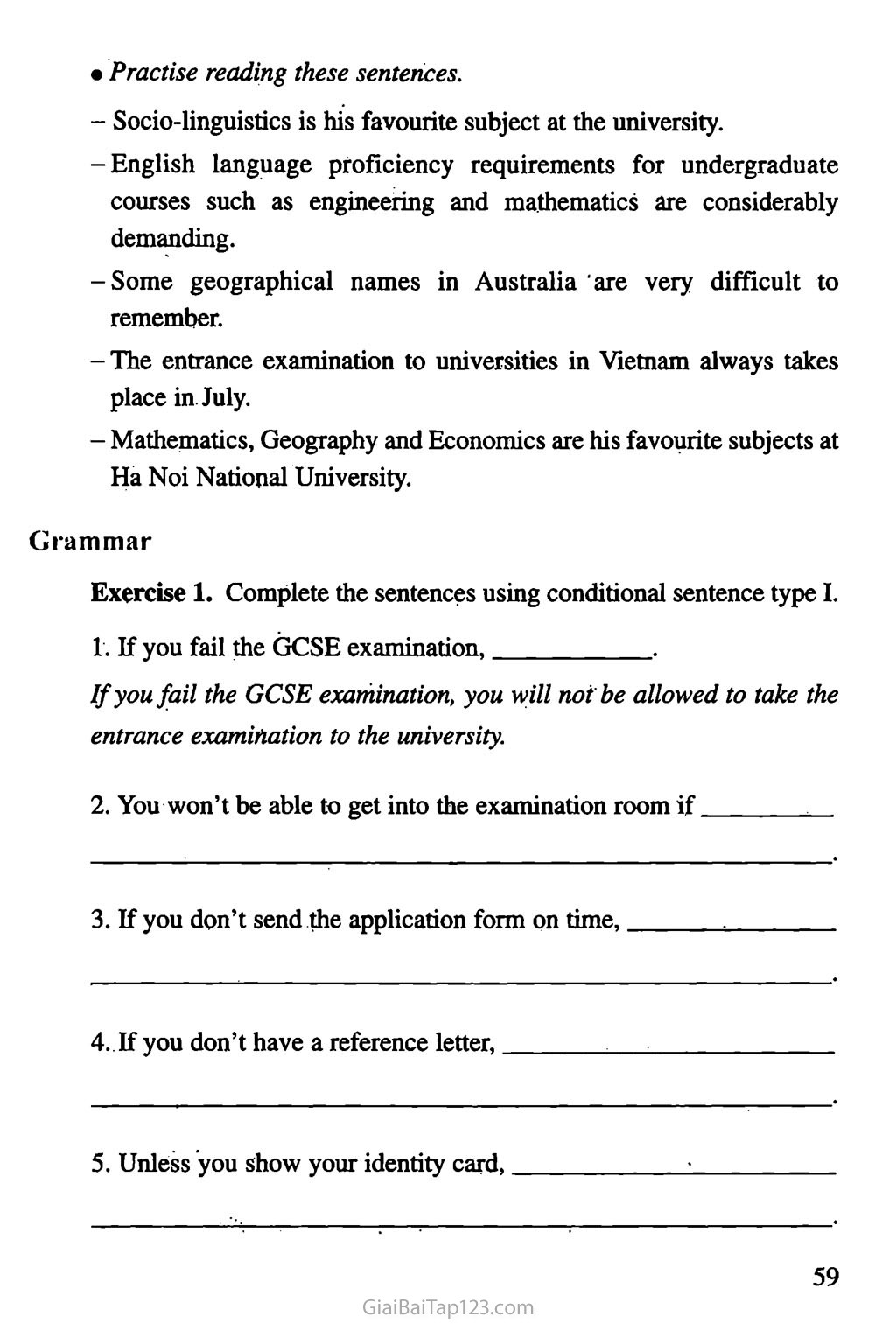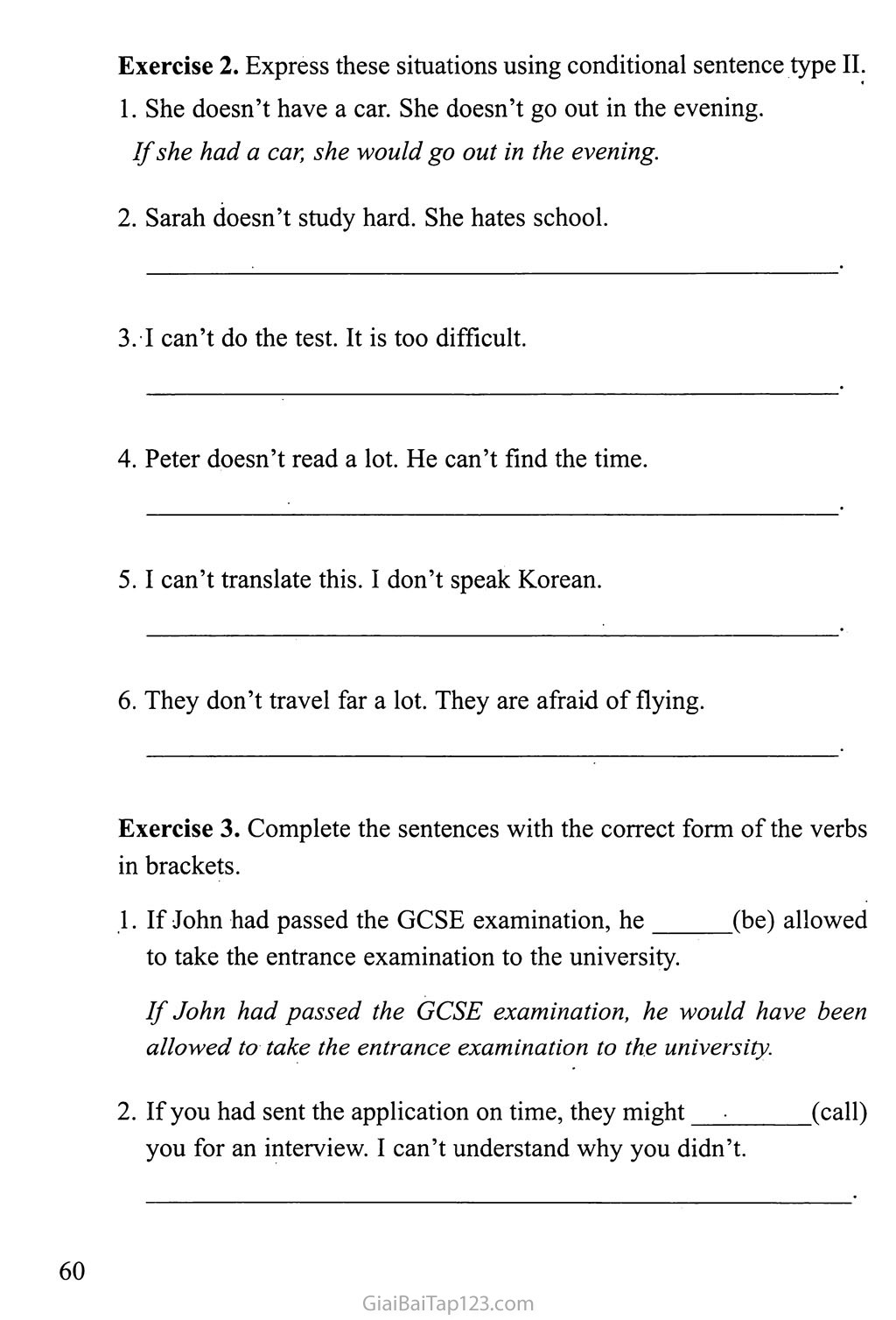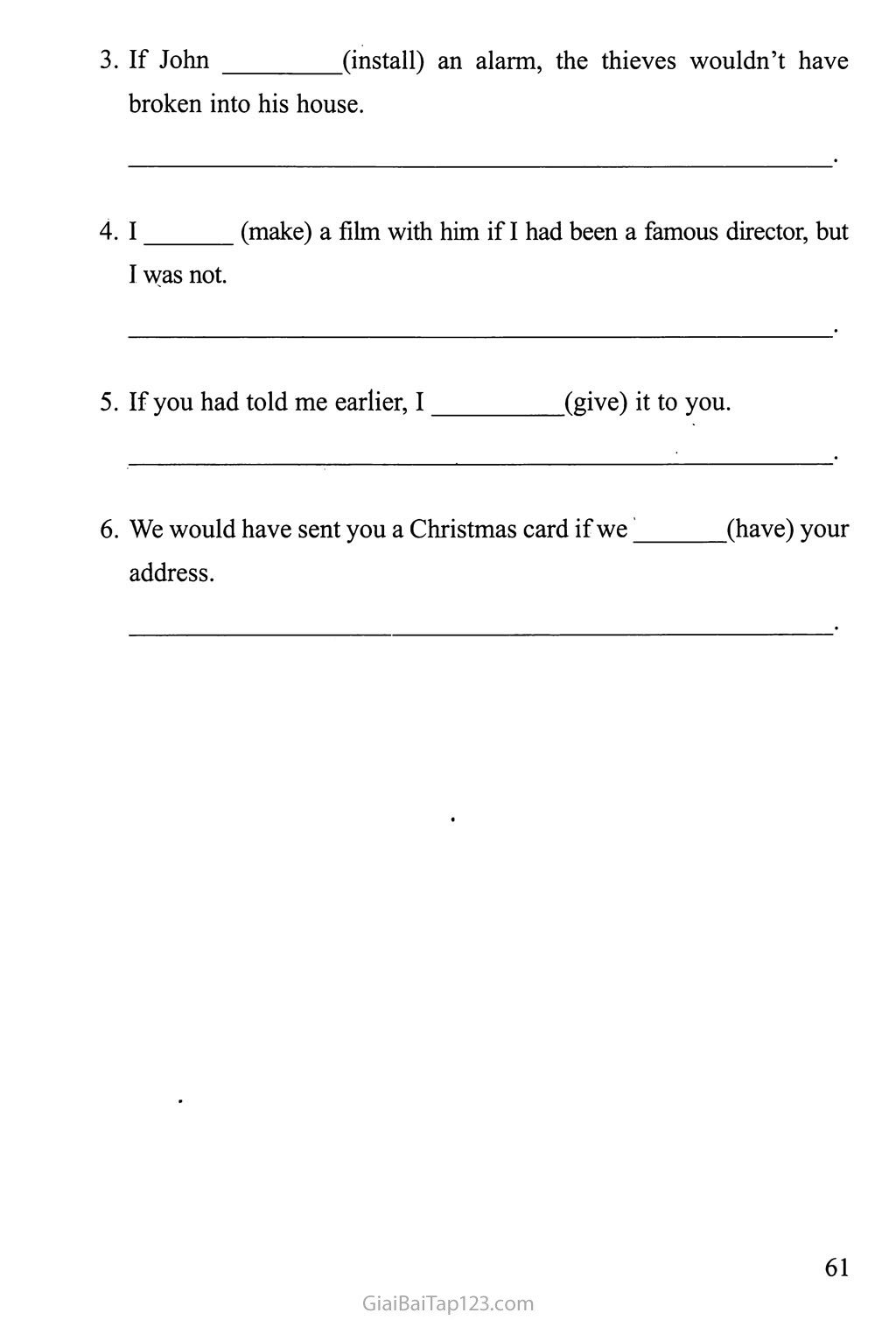SGK Tiếng Anh 12 - Unit 5: HIGHER EDUCATION
vou read Work in pairs. Ask and answer the questions. How do you say in English the names of these universities? What university would you like to apply for and why? While you read Three students talk about their first impressions of university life. Read the passages, and then do the tasks that follow. Sarah On the first weekend I went out with my new friends, walking around campus. It was exciting, thinking how I was at college, meeting people who could become good friends of mine. The most exciting thing was that I didn't have to explain to my parents where I was going, who with, or what time I'd be home! On Saturday night, I followed my roommate to a party. The people at the party were busy playing some game, and no one seemed to notice my existence. I suddenly felt so lonely. Fighting back tears, I ran back to my room, thinking I would never feel at home at college. Ellen My roommate left the window open all the time, even when it was 10 degrees Celsius out, and went to bed at 10 every night. When she got sick after midterms, she blamed my typing and having a light on while she was trying to sleep. At first, college was a little daunting. I graduated from a small school. After seeing the same people over and over for many years, it was amazing, but a little scary, to be in a place where it seemed like I never saw the same person twice. Brenden The first year at college was probably the best and most challenging year of my life. Academically, I enjoyed it thoroughly. Taking part in the Advanced Engineering project gave me a chance to use my creativity and knowledge to help society. Socially, I made lots of new friends both through engineering and living at St John's College on campus. The social calendar of the colleges provides plenty of opportunities to meet non-engineering students as well as other engineers, many of whom have become my best mates. Complete the following sentences, using the right forms of the words in the box. campus blame scary challenge amazing The new library was built in the centre of the . They the rise in oil prices for the big increase in inflation. That's the story I've ever heard. Intelligent boys like to study something if it really them. The new car goes at an speed. L \Y Task 2. Find out who: attended a party on the first weekend at college. didn't get on very well with the roommate. was not used to meeting different people every day at college. liked having a chance to be creative. was very excited about going to college. enjoyed the first year at college. Sarah: (1) (2) Ellen: (3) (4) Brenden: (5) (6) PàY Task -3. Answer the following questions. What did Sarah do on the first weekend? Why did Sarah feel so lonely at the party? What problems did Ellen have with her roommate? What did Brenden think about his first year at college? What does the social calendar of the colleges provide him? After you read Work in groups. Discuss the question. How important is tertiary study to you ? B. SPEAKING nSv Below are the admission requirements for tertiary institutions in some countries. Work in groups. Tick (/) those which are obligatory for you to be admitted to a university in Vietnam. an application form an identity card a reference letter a copy of the originals of your school certificate a birth certificate a copy of the record of your performance at school scores of the required entrance examination Work in pairs. Ask and answer the questions about the application process to tertiary study in Vietnam using the following cues. What to do When fill in the application form in March send the application form in March take the GCSE examination in May get the GCSE result in June take the entrance examination in July get the entrance examination results in August get a letter of acceptance from the late August - early university September C5=r Task 3. Work in groups. Discuss the process of applying to a tertiary institution in Vietnam. c. LISTENING Before you listen Work in pairs. Talk about the problems you may have when studying in a new school. Listen and repeat. proportion international agricultural majority available rural tutorial appointment thoroughly While you listen Listen to the conversation between John and David and circle the best option (A, B, c or D) to complete the following sentences. David used to be . an international student a tutor at the university c. a student at the university D. a lecturer at the university In his department, . many students came from other countries some students came from other countries c. the international students did not like the course D. the international students did not study well David thinks the most important thing for the international students is . not to be shy to talk to other students to make an appointment with local students c. to make full use of the tutors and lecturers D. not to tell anyone their problems David advises the international students to at the beginning of the course. find out when the tutor is available for tutorial appointments make full use of their friends c. share studying experiences with local students D. know as much as they can about the university In order to deal with the long reading lists David advises the international students to . read all the items on the reading list read the most important items on the reading list c. find out the most important reading list D. ask local students for the most important reading list After you listen Work in pairs. Ask and answer the question: “Would you prefer to do an undergraduate course abroad or in your country? ” Explain your choice. D. WRITING You want to apply for an undergraduate programme in a university in England. Write a letter of request (about 150 words) to ƯCAS to ask for the information about the admission requirements to the university, using information in the Reading and Speaking section on page 52 & 56. You may follow the outline below: Introduction: State the reasons why you are writing, your interest in tertiary study in England (mention the name of the programme/the universities/...) Request: State what information you would like them to provide: tuition fee, accommodation, exams,... Further information: Say you would be happy to supply further information about yourself such as your English proficiency and record of secondary education study,... Conclusion: End with a polite closing. E. LANGUAGE FOCUS Pronunciation: Stress in words of more than three-syllables Grammar: Conditional sentences Pronunciation • Listen and repeat. geographical archeology economics philosophy sociology psychology engineering mathematics • Practise reading these sentences. Socio-linguistics is his favourite subject at the university. -English language proficiency requirements for undergraduate courses such as engineering and mathematics are considerably demanding. Some geographical names in Australia are very difficult to remember. -The entrance examination to universities in Vietnam always takes place in July. Mathematics, Geography and Economics are his favourite subjects at Ha Noi National University. nmar Exercise 1. Complete the sentences using conditional sentence type I. If you fail the GCSE examination, . If you fail the GCSE examination, you will not be allowed to take the entrance examination to the university. You won’t be able to get into the examination room if If you don’t send the application form on time, If you don’t have a reference letter, Unless you show your identity card, ; Exercise 2. Express these situations using conditional sentence type II. She doesn’t have a car. She doesn’t go out in the evening. If she had a car, she would go out in the evening. Sarah doesn’t study hard. She hates school. 3.1 can’t do the test. It is too difficult. Peter doesn’t read a lot. He can’t find the time. I can’t translate this. I don’t speak Korean. They don’t travel far a lot. They are afraid of flying. Exercise 3. Complete the sentences with the correct form of the verbs in brackets. If John had passed the GCSE examination, he (be) allowed to take the entrance examination to the university. If John had passed the GCSE examination, he would have been allowed to take the entrance examination to the university. If you had sent the application on time, they might • (call) you for an interview. I can’t understand why you didn’t. If John (install) an alarm, the thieves wouldn’t have broken into his house. I (make) a film with him if I had been a famous director, but I was not. If you had told me earlier, I (give) it to you. We would have sent you a Christmas card if we (have) your

